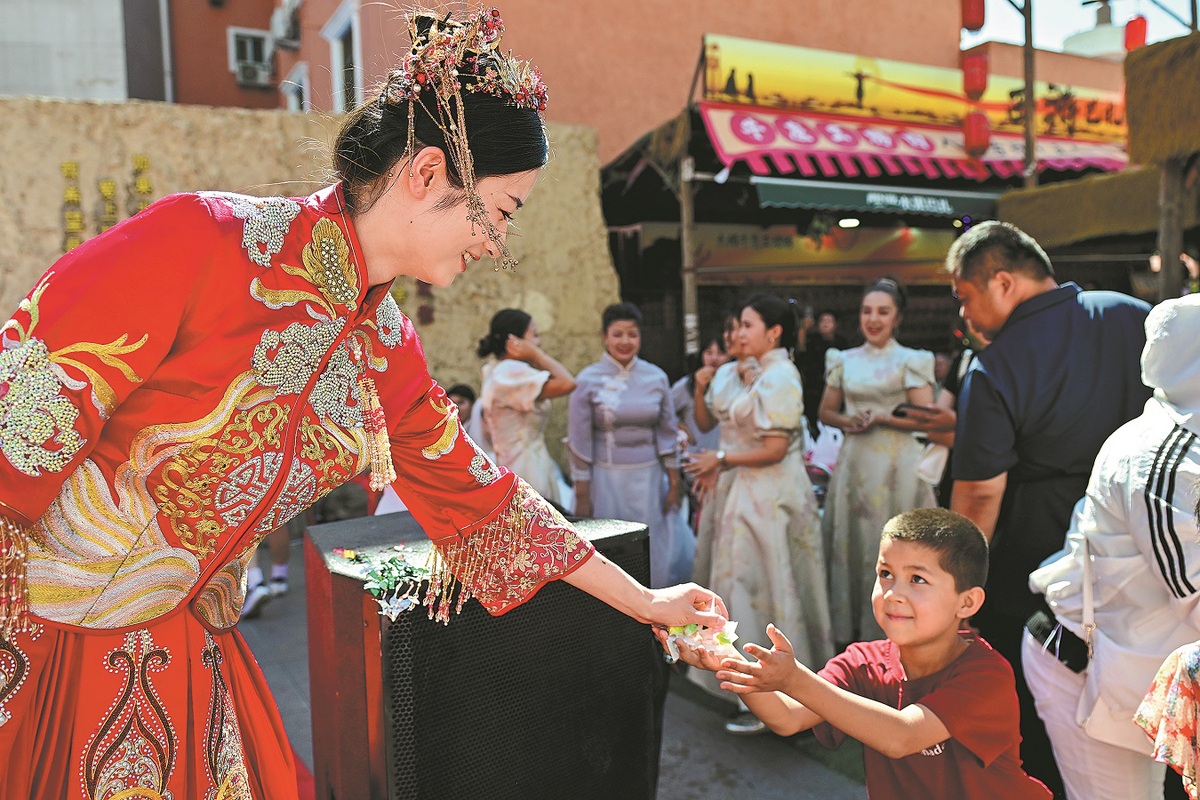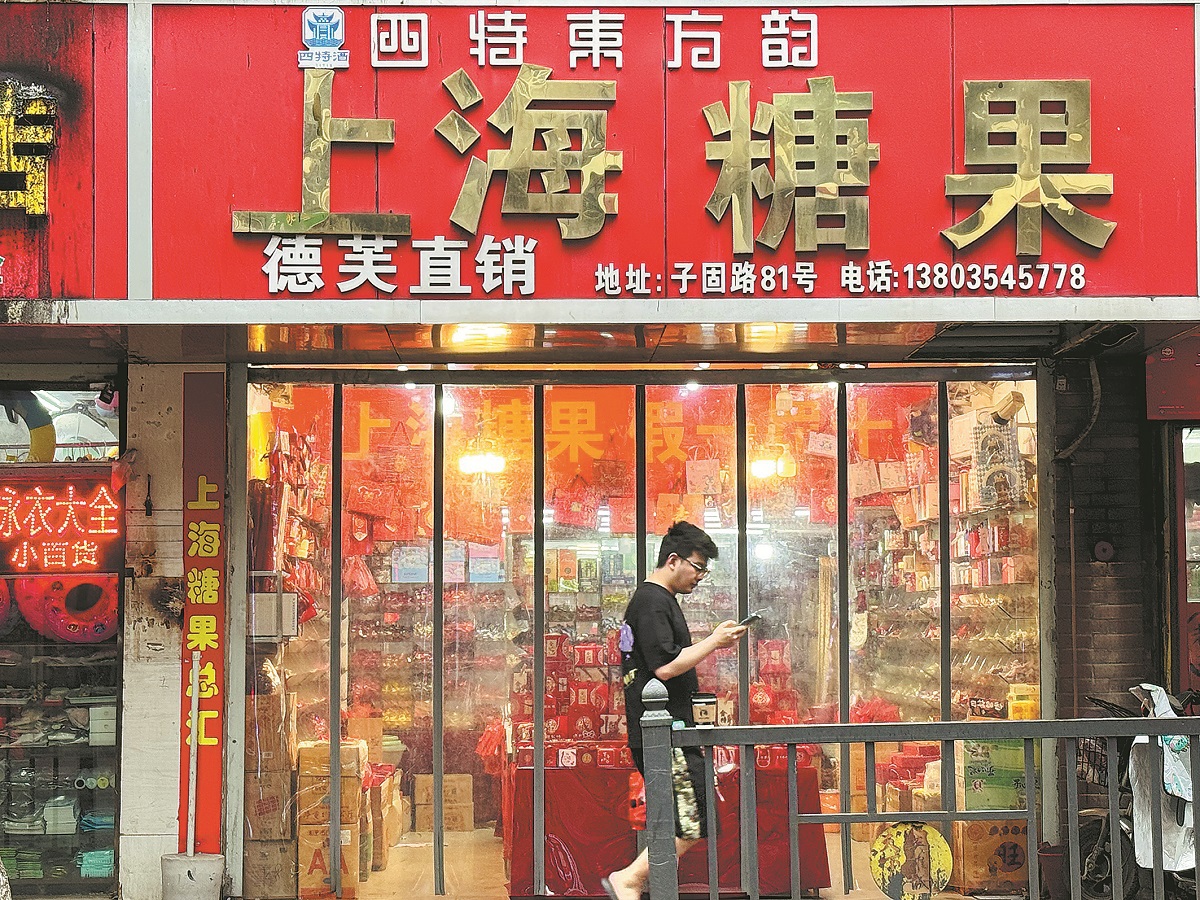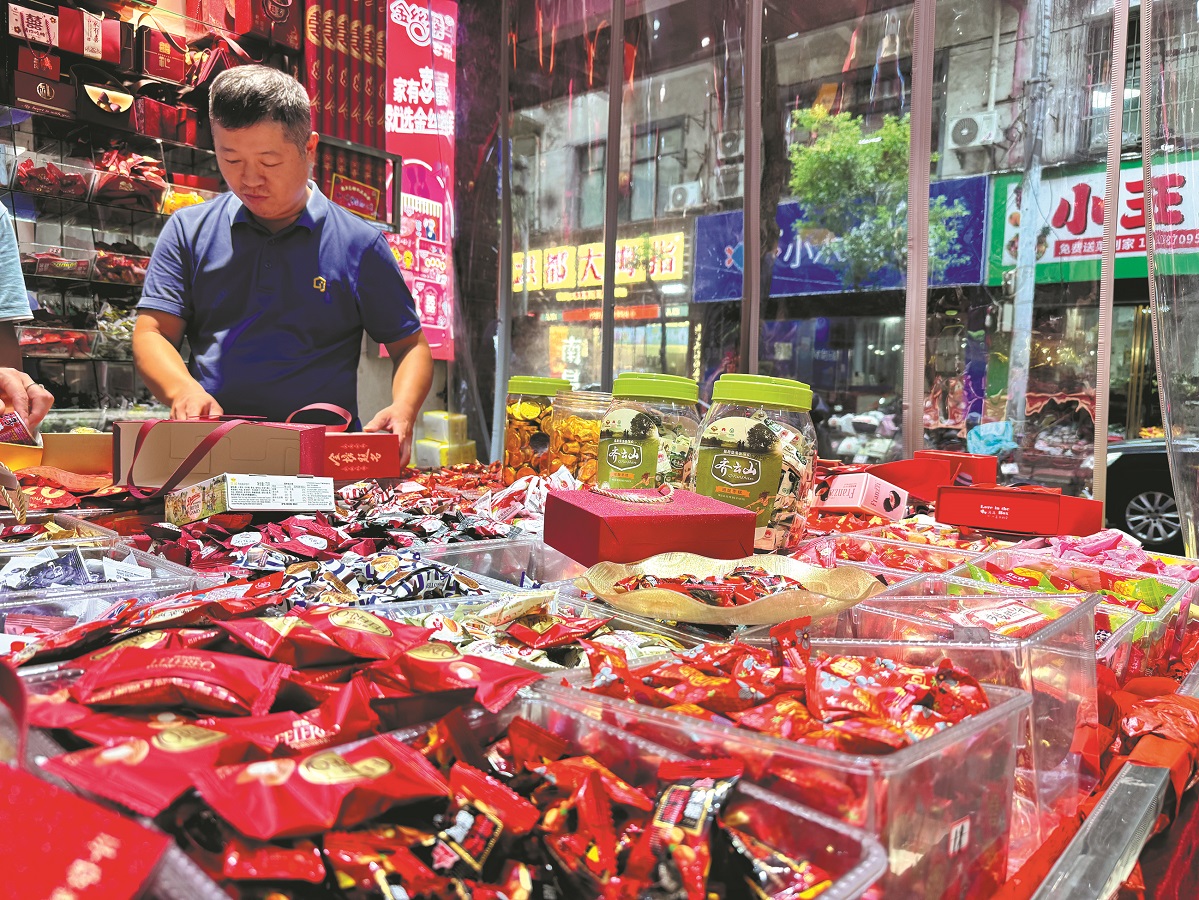Decaying Wedding Candy Sales a Sign of Social Change
Matrimonial Tradition Fades in Face of Healthier, Sugar-Free Lifestyles, Declining Nuptials
 |
| A bride gives sweets to a child at her wedding ceremony in Urumqi, Xinjiang Uygur Autonomous Region, on Saturday during Qixi Festival, or Chinese Valentine's Day. [Ding Lei/Xinhua] |
Candy shop owners on Nanchang's Zigu Road are more worried than the parents of young couples about the growing number of young people being in no hurry to get married.
"We sell candies for all kinds of celebrations, but mainly for weddings," said Liu Xiaojun, one of the candy shop owners. "This year's May Day holiday brought almost no business for us. It's been a tough year."
Zigu Road is an old street in Nanchang, the capital of Jiangxi Province, named after the famous Song Dynasty (960-1279) writer Zeng Gong, whose courtesy name was Zigu.
In the 1990s, there were more than 20 candy shops lining the road, and Nanchang families enjoyed its sweet treats, especially the popular White Rabbit candies, a household brand from Shanghai.
The street is less than a kilometer from Tengwang Pavilion, a well-known tourist spot. However, in stark contrast to the bustling tourist area, nowadays few pedestrians are seen in front of the wedding candy shops.
The declining marriage rate, competition from online sales, and the younger generation's preference for sugar-free products are all eroding the revenue of these small shops.
Traditional Treats
It's late July, and Nanchang is still very hot and humid, even at dusk. One of Liu's customers, Qiu, arrives in a white car and enters the Zigu Road candy shop.
She recently got married and needs wedding sweets for the banquet. Qiu points at some fancy candy boxes and asks Liu — "how much are these?"
A short while later, she returns to her car carrying a large red plastic bag.
Candy plays a small but essential role in any traditional Chinese wedding. It is often handed out at the reception feast or offered as a wedding favor to guests.
Typically, candy is also exchanged between families as a traditional symbol of happiness and to invoke good luck for having many children.
"A single wedding candy order usually costs around 1,000 ($140) to 2,000 yuan. However, with fewer people getting married, our profit margins have decreased," Liu said.
Her husband, Xu Wei, pulls out a calculator and says, "We just received an order totaling 1,340 yuan. After all expenses, our profit is less than 100 yuan, and we also need to pack the candies for the customer."
Each small wedding pack usually contains 8 to 20 different types of candies.
"When business was booming, we would be up packing candies until one or two in the morning," Xu said. "Now, we don't have those busy nights."
Daily sales are often less than a few hundred yuan. "This year is particularly tough," he said.
"They say that young people in big cities like Beijing and Shanghai are not getting married, but even here in Nanchang, few people are tying the knot."
Lately, their shop's main customers have been families hosting graduation banquets, which generates business that is slightly better than in the offseason.
Wedding candy culture in East China is popular, particularly in provinces like Jiangsu, Zhejiang, Fujian, Anhui and Jiangxi, which together account for nearly 80 percent of the market, according to China Candy magazine.
In Nanchang, whether it's to celebrate a wedding, birth, housewarming or birthday, residents like to give out candy.
The wedding candy business is also seasonal.
After the Chinese New Year, business picks up in April, peaks during the May Day holiday, and slows down until the graduation banquets in July and August. It picks up once more during the National Day holiday in October before falling off again.
No Sugarcoating
Lin Yiwei lived on Zigu Road during her elementary school years in the late 1990s, and fondly remembers the rows of candy shops filled with all sorts of confectionery. They were her favorite places in the city.
"During those days, my mom used to take me to the shop downstairs to buy candies on weekends, which was the happiest moment for me. Later in the 2010s, these shops moved to the middle section of the street, and we moved out of the district," Lin said.
Now, there are only eight candy shops remaining on Zigu Road. The street is a microcosm of China's wedding candy industry. In recent years, the declining number of marriages has had an impact on various aspects of economic life, including the candy industry.
The number of marriages in China dropped from 13 million in 2013 to below 7 million in 2022, reaching the lowest level since records began in 1986.
It was only last year that the number of marriages started to pick up again.
From 2013 to 2016, China's marriage rate hit new highs, leading to a resurgence in the Chinese wedding candy market.
During this period, the market expanded from 30 billion yuan to about 40 billion yuan, with an annual growth rate of over 10 percent, surpassing the growth rate of the traditional candy market.
However, a report by market research company Mintel indicates that China's candy industry experienced a turning point in 2014 and has been declining ever since.
Furthermore, the marriage rate in Jiangxi is notably low.
According to the China Statistical Yearbook 2023, Jiangxi's marriage rate stood at 4.65 percent, ranking among the lowest in the country. Last year, only 210,000 couples registered their marriages in Jiangxi.
It's also uncertain whether those intending to get married will buy candies from brick-and-mortar shops or purchase them online.
Lin said most of her married friends either buy candies online or entrust the entire wedding ceremony to a matrimonial agency. "None of my friends go to brick-and-mortar candy shops," she said.
Youyou, who married in May, spent an afternoon comparing prices on e-commerce platforms like Taobao and Pinduoduo while preparing for her wedding. She finally decided to buy 700 boxes of wedding candies online.
"Each box of candies costs about 1.9 yuan, and I bought what I like to eat. Weddings are expensive, so I try to save where I can," she said.
The quality of wedding candies bought online can vary, but the variety is greater, and products are updated quickly. Offline shops also have to follow online trends.
 |
| A man walks past a candy shop in Zigu Road in Nanchang, Jiangxi Province. [Zhao Ruinan/China Daily] |
E-Commerce Deals
On social media platform Xiaohongshu users share detailed shopping guides, including how to assemble candy boxes using different candies and chocolates wrapped in colorful paper.
Savvy young people compare prices and products, making online shopping more attractive and fun. Even those who go to brick-and-mortar shops use their phones to check prices and negotiate with the shopkeepers.
However, online shopping is not always cheaper. For example, WoWo milk candies cost about 19 to 21 yuan per 500 grams on Taobao.
Liu sells them for 18 yuan in her shop, with possible discounts for bulk purchases.
"Online shopping does impact us because they offer more variety, and it's more convenient to shop directly on your smartphone with a quick delivery," Liu said.
To compete with e-commerce, candy shops are offering better services, such as promising "10 times the compensation for any fake product", free candy box packaging, and free home delivery. Refunds were even offered for postponed weddings during the COVID-19 pandemic.
Nonetheless, competition is fierce.
Some shop owners, who once charged less than 1 yuan for the boxes the candy comes in, are now giving them away. Once one shop starts giving away the boxes, others are forced to follow. The loss is recouped by slightly increasing the price of the candies.
Qiu is one of those who prefers buying candy in a store.
"Many online gift boxes look flashy but don't have as many varieties as they seem. It's more reliable to buy offline, where I can see and touch the products," she said.
 |
| Shop owner Xu Wei sorts candy at his store in Zigu Road, Nanchang. [Zhao Ruinan/China Daily] |
Healthy Lifestyle
A major reason the candy market is in decline is that candies are not as popular with young people as they once were. They have been replaced with sweet alternatives such as fruit and tea-flavored beverages, while there are also sugar-free, and low-sugar options for health-conscious consumers.
Many celebrities and online influencers across the world are also advocating sugar-free lifestyles, often scrutinizing the sugar content of various drinks and foods.
Urban residents' per capita sugar consumption has been decreasing annually over the past decade, according to the National Bureau of Statistics.
To address the decline, food manufacturers in recent years have come up with the concept of "functional candy" — the addition of vitamins to products to give them purported health benefits.
According to Market Research.com, global functional confectionery market reached $2.30 billion in 2022 and is expected to reach $3.98 billion by 2030.
The 2022 financial report of White Rabbit candy also highlights "functional and health-oriented" as future development trends.
In the past, it was common for families to buy substantial amounts of candy for the Chinese New Year. Today, even a small amount of 500 grams is considered "too much".
"Five or six years ago, our family still bought candy for the traditional Chinese New Year holiday. But later we found that the candy bought in February wasn't finished by the Mid-Autumn Festival," Lin said.
"Over the past two years, my parents haven't bought any candy during the Spring Festival — they only bought some chocolates that I like."
Hu Jiaying, who is getting married in Nanchang in October, delegated the task of buying wedding candy to her elders.
"Buying wedding candy is just a formality now. We don't eat it ourselves. It's too sweet and unhealthy," Hu said.
At the 2023 China Candy Forum, Wang Qi, vice president of the China Food Industry Association, said that since 2015, the total output of large-scale candy enterprises in China has been declining.
"Food consumption is shifting from survival to health and enjoyment," Wang said. "But compared to developed countries, China's candy industry lacks innovation, product variety, brand presence, and has an outdated research and development structure, resulting in a low market share."
To survive financially after the pandemic, Liu has started another business in her shop. Half the shop displays candy, while the other half has rows of women's clothes.
"We open the shop at 8 am and close at 9 in the evening. Just selling wedding candy can hardly make ends meet. We have two kids to support," Liu said.
Liu's son is in eighth grade and her eldest daughter is a high school senior. During the summer vacation, they do their homework and play games in the candy shop.
"We have no other way to make a living. We just hope more people get married so we can make some money during the upcoming National Day holiday," said Xu.
(Source: China Daily)
Editor: Wang Shasha
Please understand that womenofchina.cn,a non-profit, information-communication website, cannot reach every writer before using articles and images. For copyright issues, please contact us by emailing: website@womenofchina.cn. The articles published and opinions expressed on this website represent the opinions of writers and are not necessarily shared by womenofchina.cn.








.jpg)

 WeChat
WeChat Weibo
Weibo 京公网安备 11010102004314号
京公网安备 11010102004314号